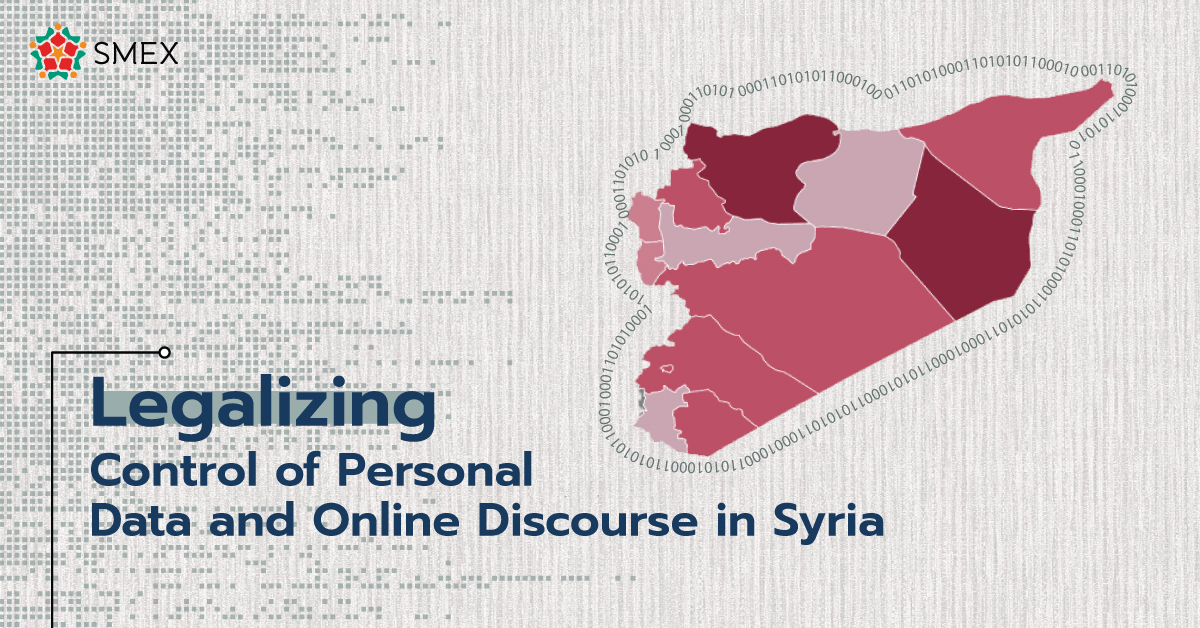In Syria, security forces are known to resort to violence when investigating freedom of expression cases in an attempt to create a state of general fear and self-censorship among citizens. Vaguely worded laws—which are used to control public discourse—restrict citizens from freely speaking about social issues.
This year, Syrian President Bashar Al-Assad issued two laws on cyberspace: 1) Cybercrime Law No. 20 of 2022, issued on March 17, which introduces amendments to the previous Cybercrime Law No. 17 of 2012 (Law on Regulating Online Communication and Fighting Cybercrime); and 2) Law No. 15 of 2022, issued on March 3, which introduces amendments to the provisions on publication of the Penal Code No. 148 of 1949. Meanwhile, the current Syrian Media Law and the Anti-terrorism Law are still used in certain cases related to digital spaces.
The new Cybercrime Law No. 20 of 2022 includes vague definitions of cybercrime and loose terminology that can be easily misinterpreted, such as defamation, libel, violation of public morals and ethics, and even criticism of the authorities. The law also penalizes those who interact or share such content on social media or even via messaging applications and forces companies to comply with government requests, with sanctions ranging from fines to imprisonment.
Cybercrime or Freedom of Expression?
The Cybercrime Law defines cybercrime as “a crime committed using computer devices or online or on IT systems or online.” This law, which regulates online communication, was enacted in 2012, but it did not have much effect until the establishment of the Cybercrime and Telecom Specialized Court in 2018 and the latest amendments introduced to the law, following several leaks that revealed the true extent to which it consolidates power in the hands of the State.
The most recent amendments undermine free communication and expression on the Internet, as they give the authorities the power to track content, give public sector workers immunity and impose harsh sanctions against violators. For example, Article 28 of the law stipulates that, “Any person who uses information technology to publish false information on the internet to undermine the State’s authority or weaken national unity shall be imprisoned from 3 to 5 years and fined SYP 5 million to 10 million.”
This vague crime can be used as a charge against anyone who criticizes the policies of the government or the president. A feminist activist who wished to remain anonymous to avoid prosecution under these laws said that the Cybercrime Law “enables the authorities to misinterpret our posts and hold us accountable, prohibiting us from opposing certain policies. We will only be able to discuss our country’s issues from abroad.”
Article 4 of the law also requires Internet Service Providers (ISPs) to “keep a copy of traffic data and hosted digital content. The Regulatory Authority or the National Authority shall set the controls governing the work of the ISP, each within their scope of competence and depending on the nature of the digital content and the services provided.”
Article 6 of the same law stipulates that ISPs who refuse to keep a copy of this data shall be subject to imprisonment and a fine. An engineer working in this field, who also wished to remain anonymous, explained that “this data is used to facilitate the tracking of Syrians through their accounts,” adding that, “the law requires ISPs to store this data to ensure that the authorities can easily access them to track certain subscribers, even after years.”
According to a human rights lawyer who wished to remain anonymous, “the new law was issued as a new tool for prosecution in the authorities’ arsenal, but this time by forcing ISPs to facilitate the task of security forces.”
The new law also protects public sector workers, without making any distinction between whistleblowing, on the one hand, and defamation, slander, and libel, on the other. Article 25 increased the penalty for defamation, slander, and libel “against any person privately on the internet” by imposing a fine of SYP 100,000 to 200,000. The penalty is aggravated to imprisonment from 10 days to two months and a fine of SYP 200,000 to 300,000 “if the defamation or slander is committed against a public employee during or as a result of their work.”
The feminist activist explained that the purpose of this article is to “prevent criticism against low-level employees, as this could pave the way for the criticism of more powerful officials with time—a risk the authorities are not willing to take.”
In an attempt to restrict access to the black market exchange rate, prevent further devaluation of the national currency, and protect the ailing economy from a more rapid collapse, Article 29 of the Cybercrime Law No. 20 of 2022 imposed heavy fines and imprisonment from 4 to 15 years on anyone who: “creates or manages a website or online page or publishes online digital content with the purpose of undermining trust in the national currency or causing the devaluation or instability of its exchange rate as determined in official bulletins.”
However, tracking is done in advance, according to the lawyer, who added that “the authorities scan WhatsApp messages in search of the term ‘dollar’ to use personal messages as a way to prosecute and imprison individuals.”
The purpose of cybercrime laws in general is to make the internet a safer space for users by preventing crimes committed online, such as hacking. However, the wording of the Syrian Cybercrime Law restricts the freedom of expression online by setting standards for acceptable discourse.
It not only stripped the internet of its primary advantage – i.e. facilitating communication and disseminating information – but also turned it into a weapon used by authorities to monitor individuals with legal cover. However, this law is just the latest stage in a long and arduous history of censoring free speech.
Arduous History
Since the arrival of the Internet in Syria, activists have used blogs and forums to criticize security and economic policies and, at times, to communicate and coordinate. However, security forces often detained activists and prosecuted them under the Penal Code before the Supreme State Security Court, which was dissolved in 2011.
The charges brought against journalists and researchers before the State Security Court due to their media statements included the “dissemination of false news that stifle the nation’s morale, espionage, and the disclosure of confidential information,” as journalist and political activist Hanadi Zahlout, who lived in Syria during that era, told SMEX.
During the 2011 protests, there were more prosecutions before criminal courts and later before the Terrorism Court, which was established in 2012 by virtue of the Anti-terrorism Law, or through software and equipment such as Blue Coat, which was used to prosecute opposition figures in 2013.
As the military operations were scaled down in most Syrian regions, the media’s focus shifted from covering battles to people’s livelihood. As such, journalists and activists loyal to the regime were arrested for criticizing its economic policies.
Prominent cases include the arrest of Wissam El Tayr, founder of “Damascus Now” page on Facebook on January 15, 2018, the arrest of “Hashtag Syria” website founder Mohamad Harsho in Aleppo on April 10, 2019, after publishing a news story on the government’s plans to hike up gasoline prices right before gas station tanks ran dry, and the arrest of a Syria TV presenter on January 21, 2021, after she published a post on her personal Facebook page.
Other media figures were suspended from working, most notably the reporter for Al Mayadeen in Syria in March 2017 for criticizing certain military leaders.
With the renewed criticism on social media of the government’s economic and oppressive policies, particularly after many people expressed their discontent with the attitude of an employee at a public establishment for food products and the publishing of images showing a metal wire fence around a crowded bakery in Damascus, the laws governing cyberspace have once again come under public scrutiny.
The new Cybercrime Law No. 20 of 2022 tightens the noose on both opponents and loyalists in the digital space. However, Syrians have always challenged such restrictions on their freedom of expression, driven by even harsher restrictions on their daily livelihood. They have never failed to raise their voices in criticism, no matter how difficult it may be.
Authorities in the region are increasingly issuing faulty cybercrime laws. The law enacted in Syria recently is not much different from those issued by countries like the United Arab Emirates, Saudi Arabia, and Egypt, in that it criminalizes online discourse rather than protect internet users from true cybercrimes.



